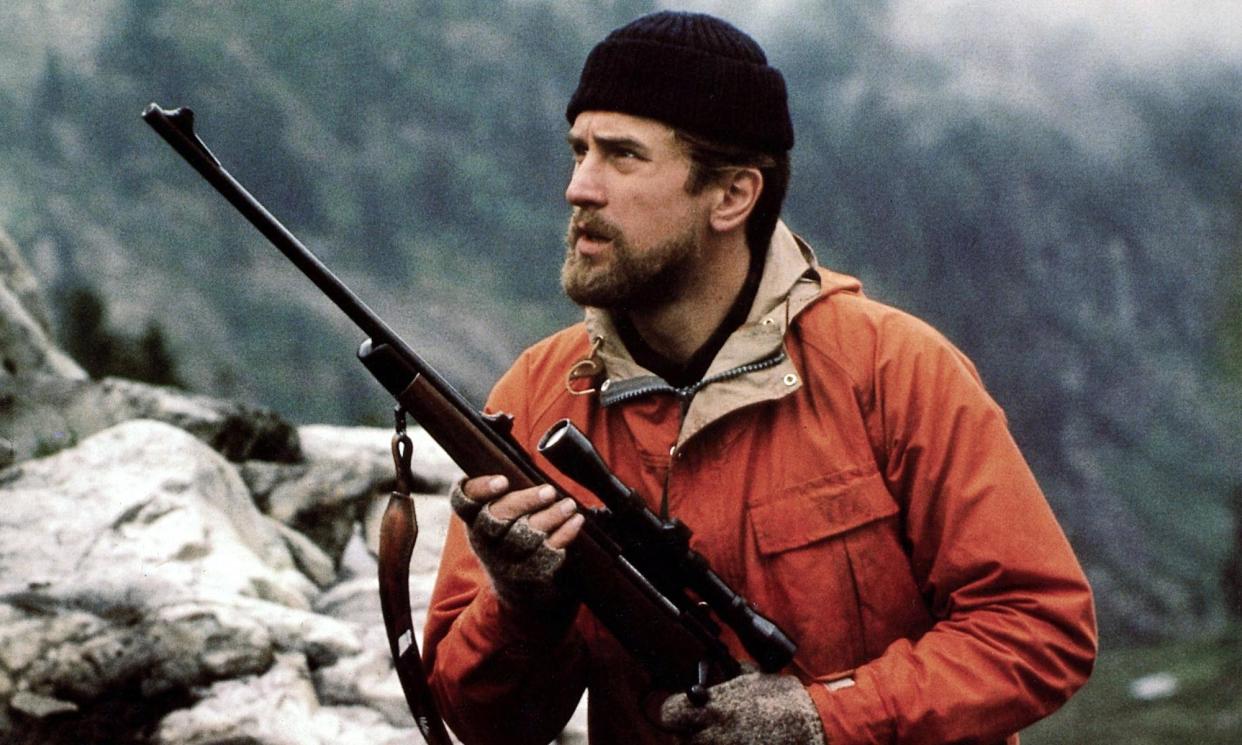The Deer Hunter reviewed: ‘more a romantic melodrama than a realist document’ – archive, 1979

It isn’t surprising that the Russians, accompanied by the eastern Europeans, walked out of the politically very sensitive Berlin festival because it insisted on showing The Deer Hunter (ABC, Shaftesbury Avenue and Studio 1, X). The film, about Pennsylvanian steelworkers of Russian origin who volunteer for Vietnam, are captured and tortured by a Vietcong cadre and forced to play (wait for it) Russian roulette, is hardly likely to endear itself to the Soviet bloc at this stage of the power game.
It is, however, an extraordinarily powerful film – one which can be spoken of in the same breath as Lewis Milestone’s All Quiet on the Western Front or Kubrick’s Paths of Glory if only because it has essentially a similar view of how bitter armed conflict can break the minds of its human cannon fodder. But a “correct” political film it is not, either for left or rightist viewpoints. Indeed it appears to concern itself as little about the politics of Vietnam as do its stunned blue-collar protagonists.
Related: Robert De Niro’s Deer Hunter archive – in pictures
Though remorselessly actualist in tone, so that the Russian roulette sequences are almost too painful to look at, it is more a romantic melodrama of epic proportions than a realist document for its time. The survivors are in the end almost in a state of grace as they sing God Bless America after the funeral of their dead friend back home. It is much less an uncomprehending, patriotic gesture than an affirmation of life after journeying through the nearest approximation for them to hell on earth.
Over three hours long, the film is virtually in three parts. The first has a beautifully vivid account of its chief characters at work and in leisure in the steel town. There is the work itself (which most films studiously ignore), the deer-hunting of the title, the personal tensions in between and finally magnificent Russian Orthodox wedding sequence from which Michael (Robert De Niro); Nick (Christopher Walken) and Steven (John Savage) are rudely plucked by Michael Cimino, the director, and deposited into the mire of Vietnam.
This instant transition hardly suggests, as the script implies, that they have been there for 18 months; but it is nevertheless a stunning device with which to lead us into the horrifying sequences of capture and torture, ending in escape and separation. Steven is badly injured, Nick is taken to a psychiatric ward in Saigon and Michael, their putative leader, goes home alone, totally unable to face the patriotic bravo-ing of the welcoming party.
The last section of the film has Michael discovering that both his friends are alive, one legless in America, the other virtually mindless in Saigon. Unable to exorcise the ghosts of his own experience, he almost forces Steven back to his wife (shades of Coming Home) and then travels back to Nam to discover Nick a heroin addict, playing games of Russian roulette for both his fix and money to send back home.
Such a bleak catalogue of disaster would seem on the face of it, to restrict the film’s audience to masochists or those for whom entertainment is a dirty word. But there are at least three reasons why anybody remotely interested in the cinema should see this British-financed but quintessentially American film. The first is that Cimino, whose Thunderbolt and Lightfoot gave no hint of it, has somehow managed a film of such intensity and feeling that three hours is for once justified.
The second is that almost every performance is superb. De Niro gives what is certainly the most mature and thoughtful, though not the most spectacular, portrayal of his career. Walken, whom I first noticed in Next Stop, Greenwich Village and Annie Hall but first really admired in James Ivory’s Roseland, plays with a passion that should now herald a major star. And Savage, John Cazale and, in the one female part of note as Nick’s girl and Mike’s lover, Meryl Streep could scarcely be much better. The ensemble playing is worthy of Altman at his best, with the long wedding sequence at least as interesting as anything in A Wedding.
The third reason you should not miss the film has, strangely, something to do with its obvious lack of political perspicuity. Cimino mirrors the attitudes of his characters so precisely, neither above nor below them in his own approach, that he has managed to achieve what a more overtly political film might not have done – a perfect reflection of everyday America’s puzzlement, fury and despair at the outcome and aftermath of the one war it didn’t win.
This is certainly not the aware world of the protest movement, the peace marches, the pro-war lobby and the rightwing backlash. It is the story of those who knew little and cared less until pitched up to their necks into an experience they were not equipped to comprehend. And in the end it honours them for standing up to it, and perhaps for managing a stature that, without it, would have been impossible. Cimino’s film might really be better related to some of the classic Westerns than to the two anti-war films I have already mentioned. That way, we can see its purposes more clearly than if we persist in asking why it isn’t the definitive statement on Vietnam, I believe The Deer Hunter will live longer than the present arguments about it.

 Yahoo Movies
Yahoo Movies 
